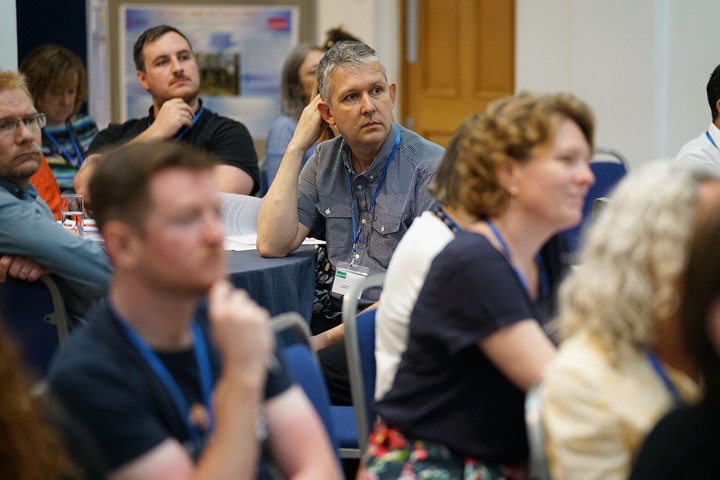inTuition taster - Don't lock people out of education
SET members like Nafisah Graham-Brown bring opportunity to some of the poorest and most disadvantaged people in British society. Alan Thomson, editor of inTuition, reports.
Teacher Nafisah Graham-Brown works in an area of east London where traditional working class neighbourhoods give way to trendy urban living for young professionals.
“This is what much of Hackney is like,” says Nafisah, indicating the sleek, balconied flats that overlook a stretch of the Regent’s Canal and the solitary, brick-built Victorian warehouse (now offices) squatting defiantly next to its concrete, steel and glass neighbours.
“People will say that much of Hackney is on the up, but a lot of this is due to well-educated and wealthier incomers. The reality is that there is still a lot of deprivation across Hackney, and people from these communities lack the opportunities that some of the newer residents take for granted.”
Nafisah works for ELATT, a charitable adult and community learning (ACL) provider offering – frequently free – education and training in areas including web design, computer engineering, business IT and administration and ESOL. She joined ELATT in 2009 as an ESOL teacher and is now head of life skills and community.
Many of ELATT’s students are refugees and recent immigrants, as well as those struggling to find employment after redundancy and/or extended periods away from the jobs market.
Community-based approach to learning
ELATT’s community-based approach to learning impressed the judges of the TES FE Awards so much that it was named Overall FE Provider of the Year 2016, as well as winning the Training Provider and Employer Engagement categories. It was judged an outstanding ACL provider by Ofsted in 2015.
Nafisah’s belief in education’s transformative power is derived from her teacher grandfather’s sense of social justice, as well as her Muslim faith. Although born in Queen’s Park, north west London, she spent much of her childhood in her mother’s homeland, Malaysia.
She returned to England to study A levels at Amersham & Wycombe College while working at McDonald’s. A part-time degree in business studies and finance followed and, by the time she graduated, Nafisah was also managing three McDonald’s outlets.
Having changed jobs to work with Welcome Break, she became more involved in staff training and her interest in teaching began to crystallise. In 2008, she did a PGCE part-time at the UCL Institute of Education, London, followed by a Master’s in comparative education. She gained Qualified Teacher Learning and Skills (QTLS) status in 2010.
“My PGCE tutors and mentors were great and they encouraged me to think critically. I realised that people had many more starting points in life than I’d been used to thinking about in the corporate world,” she says.
Evidence-based research
Critical thinking underpins Nafisah’s teaching and fuels her interest in research. Having carried out research in 2009 on the needs of adult learners, funded by the former Learning and Skills Improvement Service (LSIS), she is now working towards an EdD. “The biggest difference to my career has been made by my participation in research,” she says. “The sector needs to keep moving with new and updated evidence-based research about what works well in teaching and learning. We need more teacher-led research to underpin our own professional dialogue and development.”
Nafisah’s doctoral research focuses on the role of English language teaching in helping immigrants integrate into UK society. She is particularly interested in the creation of authentic environments in which those learning English can practise and improve their skills.
ELATT has had success in securing voluntary work for its English language students. This may involve students helping out with a partner organisation such as local lunch club.
“It’s a low-risk strategy because learners will be there with colleagues and their tutors. But it is an authentic learning experience in which they can use, and improve, their English,” she says.
While Nafisah welcomes the change and opportunities promised under Area Reviews, she hopes that, in the drive for efficiency, FE is able to continue to offer a range of education and training routes for learners.
Diversity in provision
“Change is good and FE has always experienced change. But we do need to make sure that people are not locked out of education and training by accident,” Nafisah says. “We need to make sure there is still diversity in provision. For some people a mega-college may not be the right route. Some do better in smaller, alternative providers.”
ELATT tutors are helped to support their learners who may face financial, housing and childcare problems. Staff are trained and paid for additional hours worked on behalf of their students.
“At ELATT we really drill it down to how individual someone needs their learning to be. This highly personalised approach was underlined by the findings in our LSIS research in 2009,” Nafisah says.
“It is often the non-academic support you provide that can make the difference between a person turning up to class or not.”
Like many FE practitioners, Nafisah is also trying to work out how the ongoing qualification reforms to vocational education and training will impact on teachers and learners.
“It’s fine to create higher level apprenticeships and a vocational qualifications structure that aims for parity with higher education,” she says. “But this should not be at the cost of lower level skills that get people on to that first rung of the ladder.
“I recently met an ex-student of mine who is now working as a lab assistant at a university. Because of his lack of English, it took him six years to find a position comparable to the one he’d had in the country he fled.
“Returning to education, especially in a new country, can be a scary thing and it is important that everyone has opportunity. That means ensuring they have access to a route that suits them.”
What is certain is that, while these latest FE and skills reforms play out, professional educators like Nafisah will continue having a powerful and positive impact on the lives of people so easily overlooked by society. “One of the things I feel that is really important about teaching is its transformational element. It is so powerful, and it can be the equaliser in terms of social justice,” she says. “That’s what keeps me motivated and makes me want to go further in teaching and learning.”




